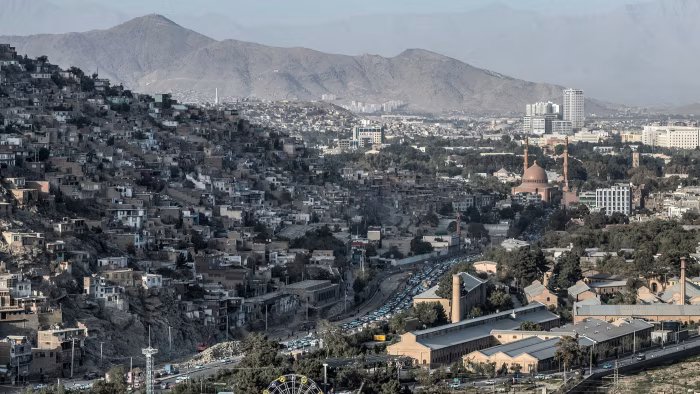Afghanistan accuses Pakistan of air strike on Kabul

The Taliban-led Afghan government accused Pakistan of launching air strikes on its capital, Kabul, in a major escalation of tensions with its former ally.
Relations between the two neighbors have deteriorated sharply in recent months amid a surge in attacks in Pakistan’s western border provinces by militants based in Afghanistan, and the alleged attack on Friday threatens to plunge the two sides into armed conflict.
After weeks in which the Pakistani military expressed increasing anger over the insurgency, the Afghan Defense Ministry said on Friday that its neighbor “violated the airspace” over Kabul on Thursday night and also bombed a “civilian market” near the border.
The ministry said in a post on the social networking site “The consequences will fall on the Pakistani army.”
The Pakistani military refused to confirm or deny its involvement in the alleged attack, but in an interview with the Financial Times earlier in the week, its spokesman issued a not-so-veiled warning to the Taliban to rein in Islamist insurgents and separatists.
Lt. Gen. Ahmed Sharif Chowdhury said Afghanistan is a haven for the Pakistani Taliban, known as the Pakistani Taliban, and Baloch separatists, referring to two groups that have been engaged in increasingly violent fighting with the Pakistani army in recent months.
“For us, this is unacceptable and we will do anything if you do that,” he added [Afghanistan] “Don’t put your house in order,” he told the Financial Times.
Asked if Kabul was listening, Chaudhry said the Taliban had “no other choice but to listen. If history tells you anything, it’s that if you keep snakes in your backyard they will bite you.”
“This is what we are telling them: You are not a non-state actor anymore, you have to act like a government. You have to make this a border, like any other border between two countries. It has to be controlled,” Chaudhry said.
Islamabad had hoped that supporting the Afghan Taliban during the latter’s long insurgency against NATO-led forces would buy influence and security for Pakistan along the 2,600-kilometre shared border.
But since the withdrawal of Western forces from Afghanistan and the Taliban’s seizure of power in late 2021, tensions have risen. This year, about 900 Pakistani security personnel were killed fighting the insurgency near the border, the highest number since 2009.
Kabul has previously accused Pakistan of carrying out air attacks on the Afghan border areas that have led to the killing of civilians since last year. Islamabad admitted to carrying out at least one attack.
Separatist groups in the southwestern province of Balochistan oppose Pakistani and foreign efforts to extract mineral resources in the region. They also seek independence for areas inhabited by the Baloch ethnic group.
The Pakistani Taliban seeks to impose a strict interpretation of Islam on the tribal belt in northwestern Pakistan. Between 2001 and 2019, it launched a brutal insurgency that killed tens of thousands of soldiers and civilians, and cost Pakistan’s fragile economy more than $100 billion, according to the Ministry of Finance.
This week, at least 12 Pakistani soldiers, including a lieutenant colonel, were killed by Pakistani Taliban militants in Khyber Pakhtunkhwa province, on the border with Afghanistan. Chaudhry said that Pakistani forces killed 1,311 “terrorists” in the year up to September 15.
A United Nations Security Council report last year estimated that at least six thousand Pakistani Taliban fighters were operating from Afghanistan. Pakistani officials claim that the organization’s resurgence is due in part to the rifles, night vision goggles and quadcopters left behind by NATO forces after they withdrew and released hundreds of fighters from Afghan prisons.
In his interview with the Financial Times, Chaudhry also accused India of using Taliban-ruled Afghanistan as a “base of operations” to support the Pakistani Taliban and Baloch rebels to destabilize Pakistan. India denies such accusations and says that Pakistan is trying to distance itself from its involvement in armed actions in the Indian-administered part of Kashmir, an accusation rejected by Islamabad.

Afghan Foreign Minister Amir Khan Mottaki, who is under UN Security Council sanctions, met with Indian Foreign Minister S Jaishankar on Friday, the first visit to New Delhi by a senior Taliban official since the movement returned to power in 2021.
In an implicit reference to Pakistan, Jaishankar spoke of the “common threat of cross-border terrorism” which the two countries must “coordinate efforts to combat”. Mottaki said Kabul remains “committed to the policy” that Afghan territory “is not used to threaten or harm others.”
This week’s trip became possible after the United Nations Security Council granted Mottaki a travel exemption. Although New Delhi has not yet officially recognized the Taliban government, it is working to deepen communication with it, and Jaishankar announced on Friday the reopening of the Indian embassy in Kabul.
“India is exploiting tensions between Pakistan and Afghanistan, as in the phrase ‘Any enemy of my enemy is my friend,’” said Nayanma Basu, a fellow at the Gateway House think tank in Mumbai and author of the book. Fall of Kabul.
Pakistan has deported more than 800,000 Afghan refugees since 2023, and periodically closed its border crossings with Afghanistan. Islamabad also sent its foreign minister to Kabul three times in five months.
“[The] The Pakistani leadership believes the Taliban are deliberately using the TTP as a weapon to coerce them, said Asfandyar Mir, a senior fellow for South Asia at the Stimson Center in Washington, adding that heavy losses to Pakistani security forces have led to a “hardening of positions in Islamabad.”
“For Pakistan, the solution lies in Afghans acting as a responsible nation,” Chaudhry said.
2025-10-10 15:42:00




